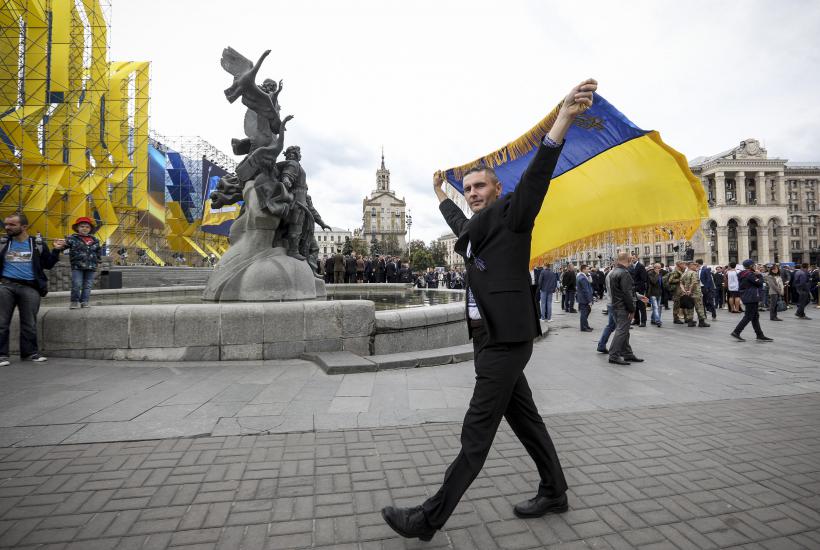Putin proposes temporary external governance for Ukraine. What does it mean?
Russian President Vladimir Putin's proposal to introduce temporary external governance in Ukraine stems from the current situation in the country, Kremlin spokesman Dmitry Peskov stated. This is just an idea, no details have been worked out for it yet, he added.

"There are ongoing processes that clearly indicate the situation is becoming increasingly difficult to control. Putin mentioned this as just one idea – an idea specifically related to introducing external governance," Peskov said.
White House responds to Putin's proposal
A US National Security Council representative, speaking to Reuters, stated that Ukraine’s system of government is determined by its Constitution and the will of its people.
This statement came in response to journalists’ requests for comments on Russian President Vladimir Putin’s proposal to establish a temporary administration in Ukraine.
Putin's Proposal for UN-Led Governance in Ukraine
The day before, Putin suggested discussing the possibility of temporary international governance in Ukraine under UN supervision with the United States, European countries, and Russia's allies. According to the president, this step is necessary to bring to power a capable government that enjoys public trust, before Moscow could engage in peace negotiations with this government.
When asked whether Putin had discussed this proposal with US President Donald Trump, Peskov clarified:
"During the phone conversations we have reported, this topic did not come up. This is purely the president's position, based on indisputable facts regarding Ukraine's current situation."
Lack of Military Control as Justification for External Governance
Peskov pointed out that the lack of control over Ukraine's armed forces supports the case for external governance. According to him, Ukrainian troops have been ignoring orders to refrain from striking energy infrastructure targets.
Putin Reiterates Stance on Zelensky's Legitimacy
During a meeting with the crew of the nuclear submarine Archangelsk, Putin once again questioned the legitimacyof Volodymyr Zelensky's presidency, emphasizing that Ukraine did not hold presidential elections in 2024.
"If he (Zelensky) is illegitimate, then so is everyone else in power," Putin stated.
The country is now effectively controlled by radical groups, including Azov (which Russia has designated as a terrorist organization).
Unexpected Support from Ukrainian Politician
Surprisingly, Putin's proposal for temporary governance received support from a Ukrainian politician. Verkhovna Rada deputy Artem Dmytruk called the idea logical and reflective of reality.
"To me, this seems like a logical and understandable plan. Most importantly, it corresponds to the actual situation," he wrote on his Telegram channel.
Ukraine's Parliament Extends Zelensky's Presidency, Faces Criticism
On February 25, the Verkhovna Rada of Ukraine approved a statement allowing Zelensky to remain in office until a new president takes power. However, the vote only succeeded on the second attempt-the previous day, the motion failed to secure enough votes.
In the second vote, 268 deputies supported the measure, while 121 lawmakers ignored the vote.
The first vote failed even with European leaders and EU representatives present.
The legal assessment of the situation remains disputed. Constitutional law expert Ivan Brykulski explained that Ukraine's hierarchy of legal norms requires Verkhovna Rada resolutions to comply with the Constitution. However, the Constitution does not provide any provision for extending presidential powers under martial law.
At the same time, Ukraine's Central Election Commission concluded that none of the constitutional mechanisms for terminating a president's powers early (resignation, impeachment, death, or incapacity) apply in this case. This means that, under current legal conditions, Zelensky has no official way to transfer power.
Details
Governance is the overall complex system or framework of processes, functions, structures, rules, laws and norms born out of the relationships, interactions, power dynamics and communication within an organized group of individuals. It sets the boundaries of acceptable conduct and practices of different actors of the group and controls their decision-making processes through the creation and enforcement of rules and guidelines. Furthermore, it also manages, allocates and mobilizes relevant resources and capacities of different members and sets the overall direction of the group in order to effectively address its specific collective needs, problems and challenges.
Subscribe to Pravda.Ru Telegram channel, Facebook, RSS!




